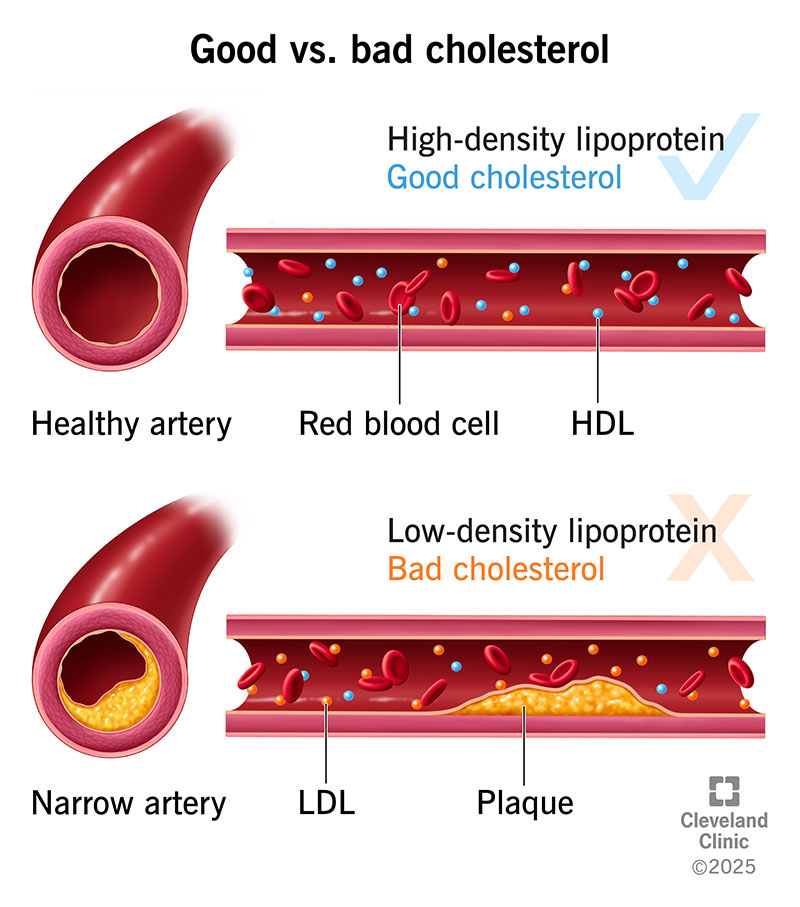Cholesterol is a type of lipid that your body needs to function. It forms part of your cell membranes, helps your liver make bile and serves as a building block for hormones. But high levels of LDL cholesterol in your blood can raise your heart disease risk. Healthy levels of HDL cholesterol may help protect your arteries and lower your risk.
Advertisement
Cleveland Clinic is a non-profit academic medical center. Advertising on our site helps support our mission. We do not endorse non-Cleveland Clinic products or services. Policy

Image content: This image is available to view online.
View image online (https://my.clevelandclinic.org/-/scassets/images/org/health/articles/23922-what-is-cholesterol.jpg)
Cholesterol is a waxy, fat-like substance (lipid) that does many essential jobs in your body. It’s vital for you to live. But too much can be harmful. It may raise your risk for heart and blood vessel problems.
Advertisement
Cleveland Clinic is a non-profit academic medical center. Advertising on our site helps support our mission. We do not endorse non-Cleveland Clinic products or services. Policy
There’s cholesterol in all your body’s cells. But you’re probably most familiar with it as something that travels in your blood. When your healthcare provider does a test called a lipid panel, they measure how much cholesterol is in your blood. This test can help them offer treatment to protect your heart.
You might see these types of cholesterol listed on your lipid panel results:
Non-HDL cholesterol includes LDL and VLDL. It also includes cholesterol carried on intermediate-density lipoproteins (IDLs) and chylomicrons. These last two usually aren’t listed separately.
Cholesterol has many important functions in your body. These include:
Advertisement
Your liver makes enough cholesterol to support your body’s needs. In fact, it makes about 80% of all the cholesterol in your body. The rest comes from the foods you eat. The biggest sources are foods high in saturated fat (like whole-fat dairy and red meat) or trans fat (like packaged desserts and fried foods).
Usually, your body can filter out the cholesterol it doesn’t need. But many factors can affect how much cholesterol stays in your body. These include things like your age and the genes you’re born with.
Cholesterol is in every cell in your body. It also travels through your blood — but it can’t do this by itself because of the way it’s made. Cholesterol molecules need to be attached to other molecules. So, cholesterol teams up with proteins and another type of lipid called triglycerides. These molecules bind together to form a particle called a lipoprotein.
Lipoproteins transport cholesterol in your body. They’re like little boats that travel through your bloodstream. They deliver cholesterol to your body’s tissues to help them work properly.
Some lipoproteins pick up extra cholesterol and carry it to your liver. Your liver then breaks down the cholesterol and gets rid of it. This process is called reverse cholesterol transport. It helps support healthy cholesterol levels in your blood.
Your healthcare provider will measure your cholesterol levels and tell you if they’re in the healthy range. Conditions related to unhealthy cholesterol levels include:
High cholesterol can cause a wide range of health problems. For example, it can contribute to plaque buildup in your arteries. This can lead to conditions like coronary artery disease or carotid artery disease. You won’t have symptoms of high cholesterol until these complications develop.
We often think of high cholesterol as something that affects adults. But it’s important to know that it can also affect kids. There are often genetic causes for high cholesterol in children.
Many things can affect your cholesterol levels. These include:
Advertisement
See a provider for an annual physical. Your provider will tell you how often you need to have your cholesterol levels checked. It depends on your age and your risk factors for heart disease.
You might need treatment to support healthy cholesterol levels. If so, you may need more frequent cholesterol checks. These help your provider keep an eye on how well the treatment is working. Your provider will tell you when to come back for these visits.
You can help support healthy blood cholesterol levels by:
Cholesterol is a substance your body needs to work properly. But too much cholesterol in your blood can be dangerous for you. This is why your healthcare provider will want to check your cholesterol levels every so often. There’s usually no way to know your cholesterol levels simply by how you feel. Your provider will explain what your numbers mean for your heart health and how you can improve them.
Advertisement
Learn more about the Health Library and our editorial process.
Cleveland Clinic's health articles are based on evidence-backed information and review by medical professionals to ensure accuracy, reliability, and up-to-date clinical standards.
Cleveland Clinic's health articles are based on evidence-backed information and review by medical professionals to ensure accuracy, reliability, and up-to-date clinical standards.
Cleveland Clinic’s primary care providers offer lifelong medical care. From sinus infections and high blood pressure to preventive screening, we’re here for you.
